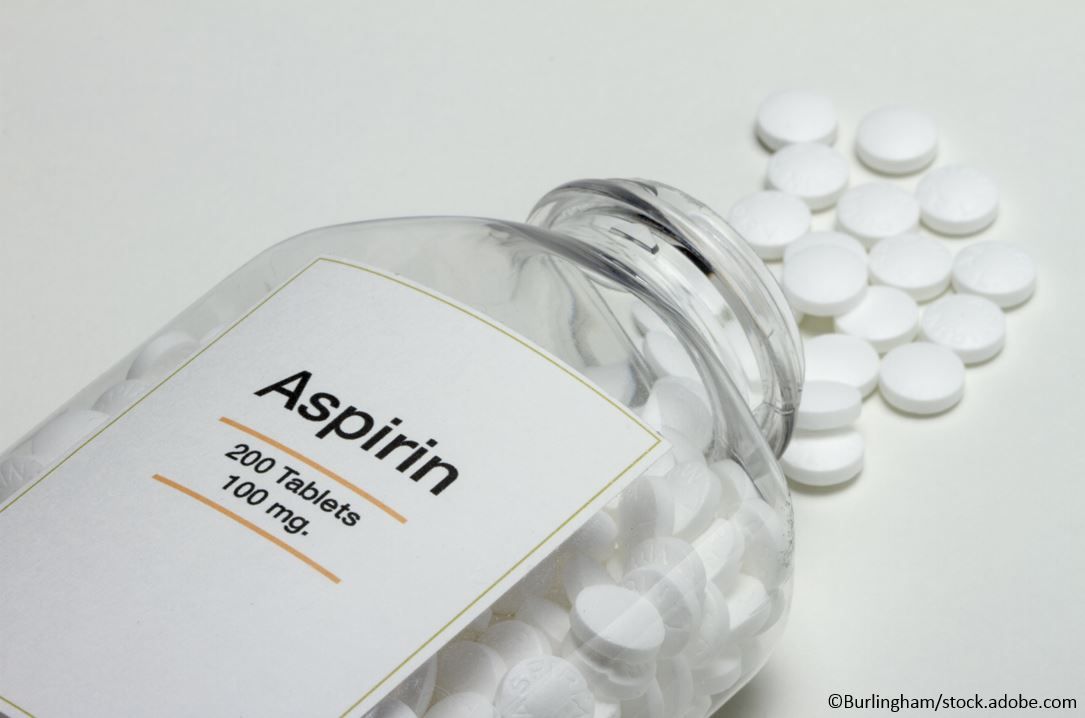- Clinical Technology
- Adult Immunization
- Hepatology
- Pediatric Immunization
- Screening
- Psychiatry
- Allergy
- Women's Health
- Cardiology
- Pediatrics
- Dermatology
- Endocrinology
- Pain Management
- Gastroenterology
- Infectious Disease
- Obesity Medicine
- Rheumatology
- Nephrology
- Neurology
- Pulmonology
Aspirin Use for Colorectal Cancer Prevention May Benefit Unhealthy Individuals Most

Regular aspirin use was associated with a greater absolute reduction in colorectal cancer (CRC) incidence among adults with unhealthier lifestyles, in findings of a recent prospective cohort study published in JAMA Oncology.1
Findings from the study of more than 107 000 participants showed that regular aspirin users had a lower 10-year cumulative incidence of CRC (1.98%, 95% CI 1.44-2.51) compared to nonregular users (2.95%, 95% CI 2.31-3.58). This corresponded to an absolute risk reduction (ARR) of 0.97%.1
Researchers observed a progressive decrease in the ARR associated with aspirin use among participants with healthier lifestyle scores (P < .001 for additive interaction). Lifestyle quality was assessed via a 5-point scale based on body mass index (BMI), alcohol consumption, physical activity, diet, and smoking; scores ranged from 0 to 5, with higher scores indicating a healthier lifestyle. For participants with lifestyle scores of 0 or 1, the 10-year ARR was 1.28% compared to 0.11% for those with scores of 4 to 5.1
“The findings of the study suggest that lifestyle risk factors may be useful to identify individuals who may have a more favorable risk-benefit profile for cancer prevention with aspirin,” cosenior author Andrew Chan, MD, MPH, director of epidemiology, Mass General Cancer Center, gastroenterology director, Center for Young Adult Colorectal Cancer, Massachusetts General Hospital, and colleagues wrote.1
Chan and coauthors cite research that shows aspirin use is associated with a 20% to 30% CRC risk reduction. Recognizing this, the US Preventive Services Task Force (USPSTF) recommended low-dose aspirin for prevention of CRC in adults aged 50 to 59 years in 2016.1 However, the task force eliminated the recommendation in 2022 due to concerns about whether the benefits outweighed potential risks, including bleeding.2
Additional research is needed to determine who would derive the most benefit from regular aspirin use for CRC prevention, investigators noted. Therefore, they analyzed data from 107 655 participants (mean age, 49.4 years)—63 957 women who participated in the Nurses’ Health Study and 43 698 men who participated in the Health Professionals Follow-up Study. Researchers defined regular aspirin use as ≥2 standard tablets (325 mg) per week, according to the study.1
Additional findings
During 3 038 215 person-years of follow-up, investigators documented 2544 incident cases of CRC. They reported the 10-year number needed to treat with aspirin was 78 for adults with lifestyle scores 0 to 1, 164 for those with a score of 2, 154 for a score of 3, and 909 for scores 4 to 5.1
Multivariable analysis showed greater 10-year ARR associated with aspirin use among those with a BMI ≥25 mm/kg2 than those with a BMI 18.5 to 25 mm/kg2 (1.19% vs 0.56%), moderate/heavy smokers compared to never/minimal smokers (1.20% vs 0.75%), those with moderate/heavy alcohol consumption compared to no/minimal consumption (1.08% vs 0.87%), and those with less than 30 minutes of daily physical activity compared to 30 minutes or more (1.88% vs 1.37%; P < .001 for all comparisons).1
Researchers acknowledged several limitations to their study including the lack of racial and ethnic diversity in the cohort; the fact that the cohort consisted of health care professionals, who tend to have healthier lifestyles; and the reliance on self-reported use of aspirin.1
References:
- Chan AT, Sikavi DR, Wang K, et al. Aspirin use and incidence of colorectal cancer according to lifestyle risk. JAMA Oncol. Published online August 1, 2024. doi:10.1001/jamaoncol.2024.2503
- US Preventive Services Task Force. Aspirin use to prevent cardiovascular disease: US Preventive Services Task Force recommendation statement. JAMA. 2022;327:1577-1584
